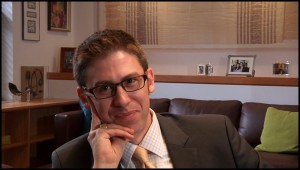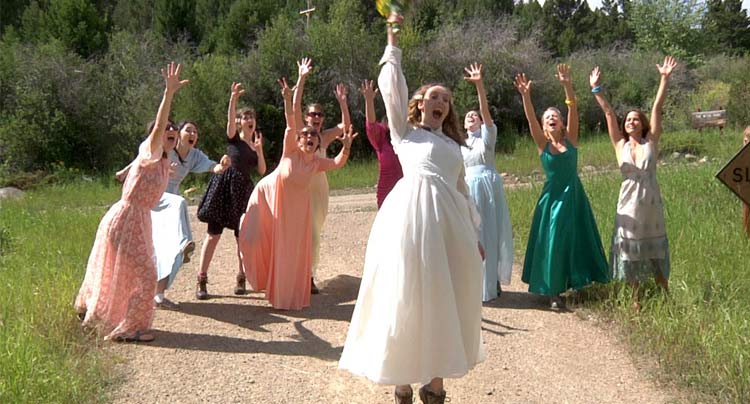Rabbi Blake Discusses Keys to a Happy Marriage
- Tuesday, 07 April 2015 19:54
- Last Updated: Friday, 10 April 2015 07:27
- Published: Tuesday, 07 April 2015 19:54
- Joanne Wallenstein
- Hits: 7455
 Senior Rabbi Jonathan Blake of Westchester Reform Temple has another movie role – this one in the film 112 Weddings which will be shown at the Jacob Burns Jewish Film Festival. The movie, by Doug Block who also made 51 Birch Street, chronicles the lives of couples that the filmmaker met when he filmed wedding over the course of 20 years. Block wondered what had become of the happy couples he filmed. Is married life what they thought it would be? In this charming, poignant film, he interviews some of the more memorable brides and grooms, juxtaposing wedding-day flashbacks with present-day reality and asking them what advice they'd give a young couple soon to be married. He also speaks to Rabbi Blake who shares his thoughts on marriage and happiness. Blake will appear on a panel at the film center after the film is shown on Sunday April 26 at 5 pm.
Senior Rabbi Jonathan Blake of Westchester Reform Temple has another movie role – this one in the film 112 Weddings which will be shown at the Jacob Burns Jewish Film Festival. The movie, by Doug Block who also made 51 Birch Street, chronicles the lives of couples that the filmmaker met when he filmed wedding over the course of 20 years. Block wondered what had become of the happy couples he filmed. Is married life what they thought it would be? In this charming, poignant film, he interviews some of the more memorable brides and grooms, juxtaposing wedding-day flashbacks with present-day reality and asking them what advice they'd give a young couple soon to be married. He also speaks to Rabbi Blake who shares his thoughts on marriage and happiness. Blake will appear on a panel at the film center after the film is shown on Sunday April 26 at 5 pm.
We watched the movie – which is worth seeing – and then posed some questions to Rabbi Blake:
About how many couples have you married?
Well, I've been a congregational rabbi for 15 years, and I usually officiate at somewhere between 7 and 15 weddings a year, so, let's say that it's over a hundred at this point.
What advice do you give to couples who ask you to perform their marriage?
The important thing is for me to get to know each couple as deeply as possible (given our three or four sessions before the big day) by listening carefully to "what makes them tick." Whatever counsel I have to offer emerges from a confidential and intimate conversation with the couple. I use a wonderful assessment tool in getting to know the couples; it's an online survey developed by Life Innovations, Inc., called "Prepare-Enrich." You can learn more about it at www.prepare-enrich.com. Some wisdom that I picked up a number of years ago turns out to be true: that the areas with which couples seem to struggle the most have to do with money, sex, and time (meaning, how they balance home, work, life, family, couple time, etc.). Among my most frequently given pieces of advice are to seek outside help in the form of a couples therapist, individual therapy, and a good accountant and/or financial planner. I also find myself constantly reminding couples that many couples have problems with no "solutions," but that successful couples are able to develop strategies for understanding and managing their problems so that they feel surmountable.
In the film you say, "We have no idea what we're getting into when we get married." Please expand on that thought.
You know, marriage is really the only project we undertake in our lives that we anticipate to sustain for five, six, seven decades without interruption or major modification. No career choice, no major life decision, not even parenting, carries the same expectations. But does anyone really know what will befall us--as individuals or couples--over the course of fifty years or more? A wise friend of mine once advised, "We should get re-married to our spouses every ten years, because, by then, you're married to a different person."
six, seven decades without interruption or major modification. No career choice, no major life decision, not even parenting, carries the same expectations. But does anyone really know what will befall us--as individuals or couples--over the course of fifty years or more? A wise friend of mine once advised, "We should get re-married to our spouses every ten years, because, by then, you're married to a different person."
What are some of your observations about happily-married couples? What do they do right and what can we learn from them?
I think my comment (above) about developing "management strategies" for problems or issues as opposed to seeking "solutions" is applicable here. I also have seen that most happily married couples acknowledge that paying attention--to each other, to the marriage--on a day-to-day basis is far more important than a big anniversary gift or a grand gesture only periodically. Simple, sustained acts of kindness, without prompting and without hope or expectation of reciprocal reward, seem to promote deeper satisfaction and generate love and compassion within marriage.
You also say, "if we took away the struggle/challenge of marriage there would be no mountain to scale" –please explain.
That's probably true of any enterprise we undertake in our lives. Surmounting challenges yields deeper perspective, empathy, and mutual understanding. Most worthwhile projects require sacrifices of time, energy, and a measure of our sanity. But without sacrifice and struggle, life can feel flat and dull.
How do you counsel couples who are struggling to keep their marriage together?
Therapy, therapy, therapy. I am a strong proponent of therapy both for individuals and couples, and I have a small but carefully curated list of trusted professionals whom I refer to congregants struggling in marriage. But the key is to acknowledge when we need help and not to allow preconceived notions about therapy or our unrealistic expectations of marriage get in the way of asking for help. As a spiritual leader I meet with struggling individuals or couples frequently; but usually after a couple of sessions the most helpful thing I can do is to refer them to a skilled professional in this area. By the way, therapy can be a great tool for maintenance or improvement of a relationship in which the couple is not struggling but would like to think about long-term issues or would simply like to experience growth.
In the movie you say, "The wedding is day one, and it's the easiest day to make happy. You've just thrown a ton of money at it, and liquor. A marriage is hard to make happy because when you throw a ton of money and liquor at it, it often makes things worse." Why does money make marriage difficult?
 Money is the number one cause of friction in marriages. Often, individuals who have become accustomed to managing their finances on their own are unprepared to join their financial picture with another person. Often it creates an imbalance of power, which can lead to behaviors such as secrecy or dishonesty. Sometimes, for example, a bride or groom enters marriage not fully realizing that his/her partner is carrying substantial debt; in other cases, couples have different priorities about spending and saving; and because money is often a source of stress for individuals, it can amplify the general stress on the marriage. Successful management of this component requires transparency and regular communication not only about bank accounts, but about priorities. I once heard it said that "the most important book in your house is your checkbook." How true! Most people don't realize this, but it contains a written record of your priorities, so problems that couples experience with money often reveal deeper incompatibilities about life priorities.
Money is the number one cause of friction in marriages. Often, individuals who have become accustomed to managing their finances on their own are unprepared to join their financial picture with another person. Often it creates an imbalance of power, which can lead to behaviors such as secrecy or dishonesty. Sometimes, for example, a bride or groom enters marriage not fully realizing that his/her partner is carrying substantial debt; in other cases, couples have different priorities about spending and saving; and because money is often a source of stress for individuals, it can amplify the general stress on the marriage. Successful management of this component requires transparency and regular communication not only about bank accounts, but about priorities. I once heard it said that "the most important book in your house is your checkbook." How true! Most people don't realize this, but it contains a written record of your priorities, so problems that couples experience with money often reveal deeper incompatibilities about life priorities.
Do you see more/less confidence in the institution of marriage than you did ten years ago?
I think that marriage continues to be a fundamental institution in American life; however, sociological studies are showing that fewer people are choosing to marry than ever before in America, and those who are marrying tend to get married later in life. This is leading to a shift in norms for career, gender roles, and parenting. It's all fascinating to observe.
See what's on the screen at the Jacob Burns Jewish Film Festival here.






